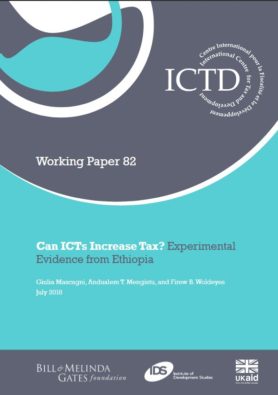ICTD Working Paper 82
The widespread introduction of information and communication technologies (ICTs) and digitalised data management systems is one of the most important developments among African tax administrations in recent years. However, very little evidence is available on their effectiveness in practice, and how taxpayers respond to these changes. This paper starts filling this gap by reporting three sets of results from Ethiopia. First, we show that the available data is still not used to its full potential, despite modern ICT systems being in place. Second, we find that a technological innovation, the introduction of electronic sales registration machines (SRMs), had a positive impact on both tax revenue and the accuracy of tax records. However, taxpayers responded to the machines by simultaneously adjusting both reported income and deductible costs, thus reducing the potential revenue gains. Third, we use a letter experiment to show that the main mechanism through which the SRMs increase tax revenue is tax compliance, rather than any change in real business activity.
